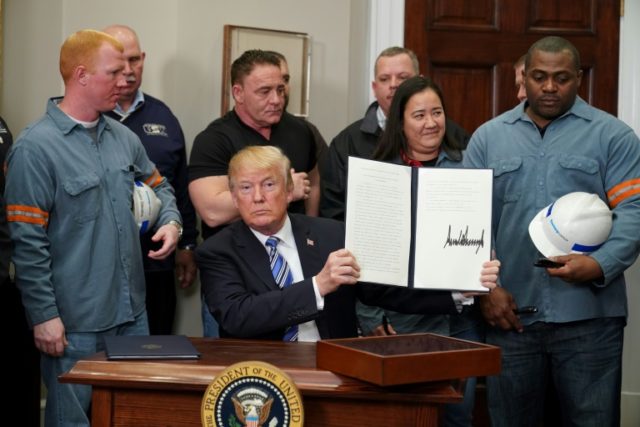Washington (AFP) – US President Donald Trump slapped contentious trade tariffs on foreign steel and aluminum Thursday, swatting aside warnings of a global trade war and protests from allies in Europe and at home.
Signalling a sharp departure from a decades-long US-led drive for more open and less regulated trade, Trump declared that America had been “ravaged by aggressive foreign trade practices.”
“It’s really an assault on our country,” he said, in announcing the tariffs of 25 percent on imported steel and 10 percent on aluminum.
Trump said the tariffs — which will come into effect after 15 days — will not initially apply to Canada and Mexico, and that close partners on security and trade could negotiate exemptions.
“Many of the countries that treat us the worst on trade and on the military are our allies, as they call them,” he complained.
The tariffs, worth billions of dollars, could spark retaliatory sanctions from the European Union, China and other economic powers.
Leaning on a little-used and decades old national security clause in US trade law, Trump said he was fulfilling a campaign promise.
“I’ve been talking about this a long time, a lot longer than my political career,” he said. “We’ve been treated very badly by our past administrations, by presidents that represented us that didn’t know what they were doing.”
The mercurial 45th president compared his action to those of predecessors George Washington, Abraham Lincoln and William McKinley.
– ‘Real friends’ –
More than 50 percent of steel and aluminum exports come from allies in the European Union, Canada, Japan, and South Korea. But countries from Brazil to South Africa are likely to be affected.
The metals are used in everything from cars to construction, roads to railways.
Trump had indicated he would be flexible toward “real friends,” and during the signing confirmed that Canada and Mexico would be permanently exempted if the ongoing renegotiation of the North American Free Trade Agreement is successful.
The US leader had earlier added Australia to a list of likely carve-outs. “We have a trade surplus with Australia, great country, long term partner, we’ll be doing something with them.”
But he singled out Germany for criticism, reviving a longstanding gripe that European NATO allies do not pay their fair share.
“We have some friends and some enemies where we have been tremendously taken advantage of over the years on trade and on military,” he said.
“If you look at NATO, where Germany pays one percent and we are paying 4.2 percent of a much bigger GDP — that’s not fair.”
– Partners promise backlash –
Last week Trump stunned the world — and his own aides — with an off-the-cuff announcement of his plan, even before White House lawyers judged the legality of the tariffs and before it was clear which countries would be targeted.
While the economic impact remains unclear, the political fallout was swift with the top Republican in the US Congress, Paul Ryan, publicly denouncing Trump’s move.
“I disagree with this action and fear its unintended consequences,” the speaker of the House said in a statement, vowing to push the administration to narrow the policy’s focus to “those countries and practices that violate trade law.”
More than 100 Republican lawmakers had written to Trump expressing “deep concern” about a policy they said could undermine economic gains from the president’s own tax reforms.
The European Union, China and Brazil have all warned they will retaliate, with the decision threatening to sour already vinegared trans-Atlantic relations.
The European Union has promised tariffs on items from steel to peanut butter, bourbon and denim — most of which are produced in states that Trump needs to win reelection.
“Trade wars are bad and easy to lose,” EU President Donald Tusk warned, rejecting Trump’s assertion they were “good and easy to win”.
Data released Wednesday showed the US foreign trade deficit widened in January to its highest level in nine years — a trend Trump had promised to reverse.
Even as Trump approved the tariffs, 11 partners in the Asia-Pacific were in Santiago, Chile, to sign a multilateral trade deal embraced by president Barack Obama but rejected by Trump.
China meanwhile warned it was ready to respond to US tariffs if they materialize.
“Choosing a trade war is surely the wrong prescription, in the end you will only hurt others and yourself,” said Foreign Minister Wang Yi.
The White House was left scrambling to catch up following Trump’s shock move last week, as top economic advisor Gary Cohn — who opposed it — quit in protest.
“He may be globalist, but I still like him,” Trump joked earlier Thursday, alluding to an ideological clash within his administration that the “nationalists” appear to have decisively won.

COMMENTS
Please let us know if you're having issues with commenting.